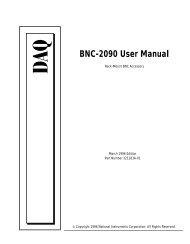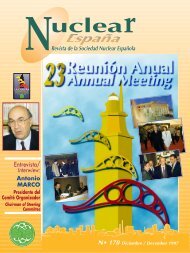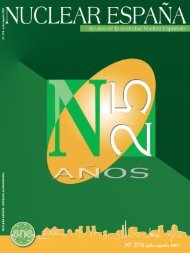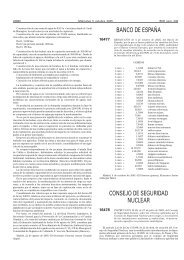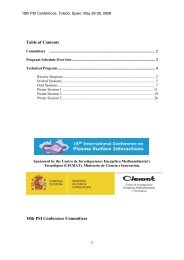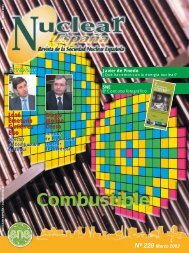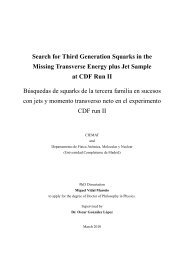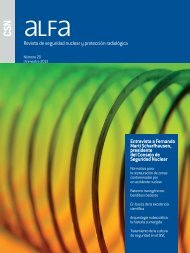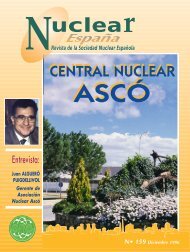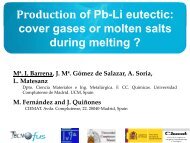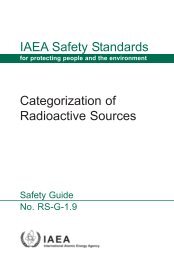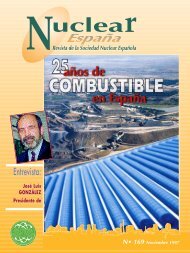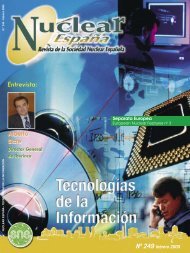EntrEntr evista/evista/ InterInter viewview
EntrEntr evista/evista/ InterInter viewview
EntrEntr evista/evista/ InterInter viewview
Create successful ePaper yourself
Turn your PDF publications into a flip-book with our unique Google optimized e-Paper software.
CENTRALES NUCLEARES/NUCLEAR POWER PLANTS<br />
experiencias operativas entre las<br />
Centrales Nucleares españolas y de<br />
las de éstas con las del resto del<br />
mundo, especialmente en materia<br />
de seguridad nuclear y fiabilidad de<br />
explotación, y (3) la representación<br />
de las Centrales Nucleares españolas<br />
en foros y organismos internacionales.<br />
En este sentido, UNESA ha mantenido<br />
una relación permanente con<br />
los organismos españoles competentes<br />
en materia nuclear, principalmente<br />
con el Consejo de Seguridad<br />
Nuclear (CSN) y con la Dirección<br />
General de la Energía -Subdirección<br />
General de Energía Nuclear. En el<br />
plano internacional, se ha participado<br />
intensamente en las actividades<br />
de las más relevantes instancias<br />
competentes en materia nuclear<br />
tanto gubernamentales (OIEA,<br />
NEA/OECD, Direcciones Generales<br />
de la Comisión Europea, etc.) como<br />
no gubernamentales (WANO, IN-<br />
PO, EPRI, NEI, EURELECTRIC, etc.).<br />
La organización del Comité de<br />
Energía Nuclear de UNESA está basada<br />
en tres Comisiones que dan<br />
cobertura a los tres Grupos Mixtos<br />
de Trabajo CSN-Centrales y a la<br />
Comisión Paritaria ENRESA-UNESA.<br />
Estas tres Comisiones son:<br />
• La Comisión de Operaciones<br />
• La Comisión de Protección<br />
Radiológica y Residuos Radiactivos<br />
• La Comisión de Tecnología.<br />
No voy a proceder a relacionar<br />
las numerosas actividades realizadas<br />
en 1999 en el marco del Comité<br />
y de sus Comisiones, sino sólo a<br />
destacar algunas de ellas por su significación:<br />
• Examen con el Consejo de<br />
Seguridad Nuclear de numerosos<br />
asuntos buscando conseguir una<br />
mayor armonización en su tratamiento<br />
o una mejora de los procesos<br />
de evaluación. Cabe citar algunos<br />
como la Formación de los<br />
Operadores de Turbina, el Control<br />
de Modificaciones de Diseño, el<br />
contenido de los Manuales de<br />
Lucha Contra Incendios, la planificación<br />
y evaluación de los Análisis<br />
Probabilistas de Seguridad (APS), o<br />
la mejora del Banco de datos de fiabilidad<br />
de componentes.<br />
• Preparación de comentarios<br />
sectoriales a borradores de Reglamentos,<br />
en particular al de<br />
Protección Sanitaria contra las radiaciones<br />
ionizantes, y a numerosas<br />
Guías de Seguridad del CSN.<br />
• Desarrollo, en coordinación<br />
con el CSN, de documentos destinados<br />
a homogeneizar prácticas en<br />
las centrales, como son los relativos<br />
a la gestión de efluentes y del<br />
Manual de Cálculo de dosis al exterior,<br />
los requisitos de vigilancia y<br />
mantenimiento de baterías, la formación<br />
aplicable a trabajadores externos<br />
y la “Metodología Española<br />
de Validación de Sistemas de<br />
Ensayos No Destructivos” para la<br />
Inspección en Servicio de las centrales<br />
nucleares.<br />
• Coordinación del intercambio<br />
de experiencia operativa entre las<br />
Centrales Nucleares españolas y<br />
con las extranjeras, incluyendo la<br />
participación de un ingeniero residente<br />
en la Asociación Mundial de<br />
Operadores Nucleares (WANO) y la<br />
colaboración con el Instituto de<br />
Operaciones Nucleares (INPO) y<br />
con el Instituto de Energía Nuclear<br />
(NEI), de los EEUU.<br />
• Participación en “Peer<br />
Reviews” (Auditorías Técnicas) de<br />
WANO a centrales de Finlandia y<br />
Africa del Sur y coordinación de la<br />
participación de técnicos de las<br />
centrales en otros “Peer Reviews”.<br />
Realización de misiones WANO financiadas<br />
por la UE para revisar y<br />
auditar la adaptación al Efecto 2000<br />
de las centrales nucleares rusas de<br />
Kalinin, Smolensk y Kola.<br />
• Preparación y difusión de los informes<br />
semestrales sobre el funcionamiento<br />
de las centrales nucleares<br />
españolas, que están dirigidos al<br />
Parlamento, Administración,<br />
Industria, Universidades y medios de<br />
comunicación y de la publicación<br />
anual sobre el funcionamiento de las<br />
centrales nucleares españolas para<br />
difusión nacional e internacional.<br />
• Soporte al Foro Nuclear en la<br />
preparación y mantenimiento de<br />
documentación de apoyo a las tareas<br />
de comunicación nuclear.<br />
• Participación en el programa<br />
CIR (Cooperative Irradiation –<br />
Assisted Stress Corrosion Cracking<br />
Research) de EPRI y Preparación de<br />
la participación en la Fase II de dicho<br />
Programa. Adquisición a EPRI<br />
del programa para la evaluación de<br />
la fatiga de componentes y estructuras<br />
de centrales nucleares y asociación<br />
al grupo de usuarios de dicho<br />
programa.<br />
These three Commissions are as follows:<br />
• The Operations Commission<br />
• The Radiological Protection and Radioactive<br />
Wastes Commission<br />
• The Technology Commission<br />
I shall not go into detail as regards the numerous<br />
activities performed during 1999 within the<br />
framework of the Committee and its Commissions,<br />
but simply underline some of them for their special<br />
significance:<br />
• Examination with the Nuclear Safety Council of<br />
numerous issues, in an attempt to achieve greater<br />
harmony in their treatment or improvements to the<br />
assessment processes. Among these issues special<br />
mention may be made of Turbine Operator Training,<br />
Design Modification Control, the contents of the Fire<br />
Protection Manuals, the planning and evaluation of<br />
Probabilistic Safety Assessments (PSA’s) or<br />
improvements to the component reliability database.<br />
• Preparation of the sector’s comments in<br />
response to draft Regulations, in particular the<br />
Regulation on Protection against ionising radiations,<br />
and numerous CSN Safety Guides.<br />
• Development, in coordination with the CSN, of<br />
documents aimed at homogenising practices at the<br />
plants, such as those relating to effluent management<br />
and the external dose Calculation Manual, battery<br />
surveillance and maintenance requirements, training<br />
applicable to contracted workers and the “Spanish<br />
Validation Methodology for Non-Destructive Tests”,<br />
for the in-service inspection of nuclear power plants.<br />
• Coordination of operating experience<br />
exchanges between Spanish and foreign nuclear<br />
power plants, including the participation of a<br />
resident engineer at the World Association of<br />
Nuclear Operators (WANO) and collaboration with<br />
the Institute of Nuclear Power Operations (INPO)<br />
and the US Nuclear Energy Institute (NEI).<br />
• Participation in WANO “Peer Reviews” at<br />
Finnish and South African plants and coordination of<br />
the participation of plant engineers in other “Peer<br />
Reviews”. Participation in WANO missions financed<br />
by the EU for on-site assistance to review Y2K<br />
compliance in the Russian Kalinin, Smolensk and<br />
Kola plants.<br />
• Drawing up and distribution of the six-monthly<br />
reports on the operation of the Spanish nuclear<br />
power plants, prepared for Parliament, the<br />
Administration, Industry, the Universities and the<br />
media, and of the annual publication on the<br />
operation of the Spanish nuclear plants, for national<br />
and international distribution.<br />
• Support for the Spanish Nuclear Industry Forum<br />
in the preparation and maintenance of<br />
documentation supporting nuclear communication<br />
tasks.<br />
• Participation in the EPRI CIR (Cooperative<br />
Irradiation-Assisted Stress Corrosion Cracking<br />
Research) programme and preparation for<br />
participation in Phase II of this Programme.<br />
Acquisition from EPRI of the programme for the<br />
assessment of fatigue in nuclear power plant<br />
components and structures and association with the<br />
programme’s user group.<br />
• Management of more than 30 projects within<br />
the CSN-UNESA Coordinated Research Plan, the<br />
joint budget of which amounts to almost 800 million<br />
pesetas (5 million dollars). Ten such projects have<br />
been completed in 1999, and 205 million pesetas<br />
(1,3 million dollars) of the budget have been applied.<br />
Likewise, work has continued on the projects on<br />
A b r i l 2 0 0 0<br />
R e v i s t a S N E




